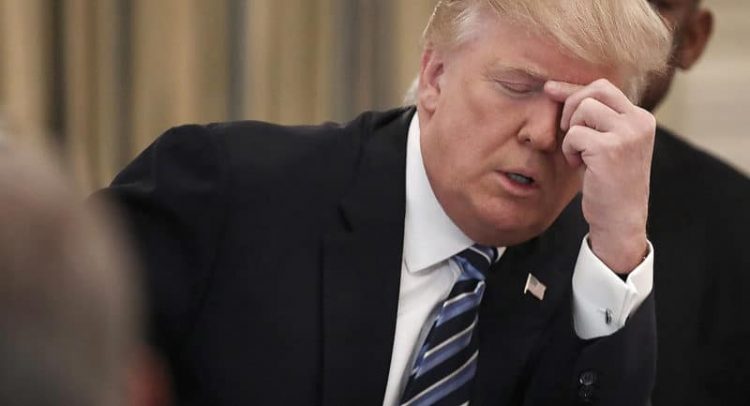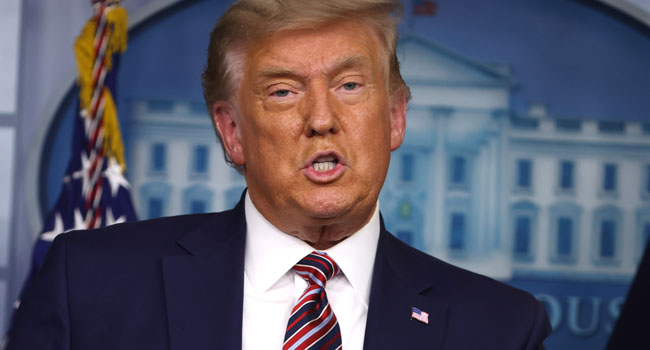How Coronavirus is finishing the job of American collapse

By Umair Haque
Another 3 million people filed unemployment claims last week, bringing the total since the beginning of the pandemic to a staggering 33 million. How much is that, in context? The US labour force is 165 million people. 33 million people means a full 20% of the labour force is now unemployed.

But even that’s an understatement. Here’s another, truer way to think about it. These numbers mean that, since the the employment to population ratio has crashed to just fifty percent. That means: just half of the American population is now employed.
These are numbers so catastrophic they make economists like me shudder. They have no modern parallel whatsoever. They point to an emerging depression — call it the Coronavirus Depression — that’s probably going to be greater and worse than the Great Depression. That’s because even the Great Depression had a New Deal. America, instead, has Donald Trump.
Coronavirus — or more accurately — the lack of response to it will probably finish off what’s left of the American economy. America will end up a country with permanently lower levels of all the following: employment, income, savings, trust, happiness, assets, and so forth. America was already in the process of becoming something very much like a poor country, with the failed politics of one, too — but Coronavirus will accelerate and finalize America’s grim transformation into poverty, paralysis, and collapse.

I know that sounds improbable, maybe even absurd, to some. I don’t much like writing in such terms myself. So let me spell out just how and why.
These shocking, unreal unemployment numbers are like the shockwave of a great tsunami, or the tremors that signal an earthquake spiking off the Richter scale. They’re a beginning, something like a plume of smoke to be followed by a deafening explosion.
Coronavirus — or more accurately — the lack of response to it will probably finish off what’s left of the American economy. America will end up a country with permanently lower levels of all the following: employment, income, savings, trust, happiness, assets, and so forth. America was already in the process of becoming something very much like a poor country, with the failed politics of one, too — but Coronavirus will accelerate and finalize America’s grim transformation into poverty, paralysis, and collapse.
Why? The logic of depression is simple — Keynes discovered it a century ago. It involves two things: money, and confidence. An economy undergoes a shock — a stock market crash, a natural calamity, or, in this case, a pandemic. I lose my job. I stop spending. So do my neighbours. Our local businesses — who usually exist on the margin, with little in reserve — begin to go shutter their doors, as a small but crucial number of customers stays away. That causes yet another wave of unemployment, which causes yet another wave of bankruptcy, and so on. Until, at last, the vicious spiral has engulfed the whole economy.
By that point, five transformations have happened — that usually spell ruin for a generation or more.
First, because waves of businesses have closed, the nature of unemployment changes: it goes from a short term challenge to find work, to a long term lack of jobs at all. You can already see that happening in America. Many of the jobs lost now aren’t coming back — ever. Those businesses, small and medium sized ones, are gone for good. Their owners will spend years in liquidation — if they’re lucky. How many will ever start businesses again?
Bang! The few jobs that are left are “low-income service jobs” offered by mega-monopolies, which means delivering groceries and driving cars and walking pets. But they don’t provide stable incomes, benefits, guarantees, much less raises, career paths, and so on But when economy’s labour force…goes nowhere…what future can it really have?
That brings me to the second transformation depressions wreak. Economies grow permanently poorer. Yes, as in “forever.” That’s already happening in America, too. yesterday’s if not great but somewhat decent jobs were already being substituted away by the new, gruesome “gigs” that modern-day American techno-capital offers — driving an Uber, delivering an Instacart, selling a pallet on Amazon — but Coronavirus has accelerated that transition, massively. Megacorporations aren’t going to magically hire huge numbers of people once they’ve found out they can make do with permanently lowers levels of hiring. But lower levels of hiring across the economy mean that workers have less bargaining power. Bang! Incomes fall — the share of the economy going to working people craters. What’s the net result? Society grows poorer.
Why is it that the average American is the only person in the rich world by now who votes against their own healthcare, retirement, education, childcare, and so on? Because they can’t afford it. 80% of Americans lived paycheck to paycheck before Coronavirus. Who can afford to pay an extra 5% or 10% in taxes for decent social systems? Nobody, really, except the already rich — who don’t need them. Hence, the famous paradox of the American Idiot: people who vote against their self-interest. It’s not their fault, really: they have no choice. They can’t afford to vote for things like public healthcare.
What happens to poorer societies? They’re left in a kind of terrible paradox, which is my fourth transformation: they can’t afford the very things they need to survive most. Why is it that the average American is the only person in the rich world by now who votes against their own healthcare, retirement, education, childcare, and so on? Because they can’t afford it. 80% of Americans lived paycheck to paycheck before Coronavirus. Who can afford to pay an extra 5% or 10% in taxes for decent social systems? Nobody, really, except the already rich — who don’t need them. Hence, the famous paradox of the American Idiot: people who vote against their self-interest. It’s not their fault, really: they have no choice. They can’t afford to vote for things like public healthcare.
America was already becoming too poor a society to have functioning public goods, like healthcare or retirement for all. Coronavirus is going to seal that fate. America will be poor now — far too poor to ever really make the transition to having decent public goods. Think of that full half of the American population who’s now not employed. How exactly are they going to afford the higher taxes it takes to have a European or Canadian style social contract? They struggled to before — and after Coronavirus, it’s going to be flatly impossible.
That’s another of depression’s vicious cycles: it makes nations poor, and they end up being unable to afford decent being modern societies at all, places in which people support one another with expansive social contracts, in the end — because when people can barely even afford self-preservation, how can they support anyone else’s quest for a better life, too?
That brings me to my fourth transformation: as a result of depression, an economy’s whole structure tends to change. As groups, classes, segments. Think of America not so long ago. It’s structure resembled a bell curve. A broad middle class, a small number of rich, and a larger — but still small — number of poor. And then around 2010, for the first time, America’s middle class became a minority. The gentle bell curve was on its way to becoming something more like a U-shape: a caste society of very rich, and everyone else: the imploded middle and the old working class who became the left-behinds, all of whom became the new poor, that 80% living paycheck to paycheck.
Coronavirus will accelerate that change, too. America’s already dying middle and working class will finally crumble and coalesce into one vast permanent underclass. America will have effectively a massive pool of something very much like easily, algorithmically exploited technofeudal neoserfs — people who’ve reverted to servitude to make a living, only their overseer is an app. Those “low income service jobs” are economists’ jargon for “people becoming servants again.” To whom? To a kakistocracy, if you like — a class that’s the opposite of aristocrats, who were supposed, at least, to the best and brightest. America’s ruling class is now visibly made of predators, the kinds of men who put men in cages, or addict a whole society to painkillers, just to make more money they’ll never spend.
That brings me to my fifth and final transformation. What happens to societies with imploded structures? The gentle bell curve of a modern society — a broad middle — is so crucial because it underpins and anchors democracy. Democracy is a luxury. It takes time, money, effort. To be a democratic society. A society of servants is rarely a truly democratic one — think historically for a moment — for the simple reason that, well, servants are too busy being exploited around the clock to really engage with the res publica, the body politic. So when a society’s structure implodes from a gentle bell curve into a U-shape — it’s usually accompanied by political implosion, too. Into authoritarianism, theocracy, fascism, or any number of tyrannies.
Modern history’s full of examples. In the Arab world, in Latin America, or take the canonical example, Russia. As the Soviet Union failed, what emerged wasn’t a wise and gentle democracy — but Putin’s Neo-authoritarian dystopia. But that was inevitable — because Russia never really evolved much the past the U-shape of inequality, unable to develop the bell curve of moderation that democracy requires.
America’s social structure collapsing foretold the rise of Trumpism. If you understood what the implosion of the middle class meant in 2010, you could have predicted Trumpism a mile out — I did. And what I see today is…more, only worse. Societies growing poorer can’t just not afford functioning social systems — they can’t afford democracy, either. America was on that trajectory — but Coronavirus is like adding a rocket engine to it. How democratic a nation do you think America will be when a full half of its population is now not in employment? You can already see that Americans hover between despising each other, and being totally indifferent to each other. When self-preservation is an everyday struggle, that’s the result. But the struggle for American self-preservation is about to get a whole lot harder, more intense, more painful, more tragic. And that spells the end of America’s time as a democracy, too, most likely.
Furthermore, because in America, lockdown is being lifted prematurely — before the infection rate has even peaked — the emerging depression is going to linger. If the pandemic lasts another three months, six months, year — how long will the depression last? The answer is: every day of pandemic is going to add up to weeks, maybe months, of depression, as people lose confidence in visiting shops, spending money, or hiring anyone else. Just as in any relationship, once confidence is lost throughout an economy — it doesn’t magically spring back the next day: it takes far, far longer to regain confidence than it does to destroy it, and it’s much, much more expensive, too.
This is what a dying economy looks like. Yes, a dying economy is a nation plunging into poverty — like America. But what people often fail to understand is that it’s much more than that, too. A dying economy takes systems and institutions and public goods with it. A dying economy takes a functioning society with it — it’s gentle bell curve, it’s norms of trust and acceptance and coexistence and tolerance. And a dying economy, ultimately, takes a sane, decent, sensible politics with it — the basic elements of democracy — too.
When an economy dies, everything we cherish and treasure is dying. Jobs, yes — but so much more than that. What is really withering is human potential itself. What can a nation of people who’ve become servants, being exploited to the bone, accomplish, really? Discover, create, build, share, nurture? They will be too busy driving cars and cleaning homes and delivering gadgets — just to pay off that crushing mountain of unpayable debt — to create tomorrow’s great breakthroughs, whether books, films, vaccines, experiments. That’s the tragedy. See many breakthroughs happening in Russia these days? See much civilization, many great films or books or art or science? Even much democracy? Nope. That’s because it’s now a poor society, where the struggle for self-preservation has taken over — making anything nobler or greater or truer flatly impossible, an unaffordable luxury. That is where America is headed now as the Coronavirus Depression emerges as the first Greater Depression of the 21st century.
The economy may not be the roots of a society — call that something more like values, aspirations, ideals — but it is the trunk. And when the trunk is sundered or split by lightning — which is what this pandemic is — then no matter how strong the roots, often, the tree never grows full and strong again. That, my friends, is America’s probable future. Not “recovery.” But an accelerating descent into poverty, powerlessness, self-destruction, and chaos, by way of a depression, that will easily last a decade. It’s not pretty. And if you think all the above is what Americans so often call “negative”, then I invite you to consider this. Do you think that we can change the future without understanding the present?
The economy may not be the roots of a society — call that something more like values, aspirations, ideals — but it is the trunk. And when the trunk is sundered or split by lightning — which is what this pandemic is — then no matter how strong the roots, often, the tree never grows full and strong again. That, my friends, is America’s probable future. Not “recovery.” But an accelerating descent into poverty, powerlessness, self-destruction, and chaos, by way of a depression, that will easily last a decade. It’s not pretty. And if you think all the above is what Americans so often call “negative”, then I invite you to consider this. Do you think that we can change the future without understanding the present?
*Umair Haque is a London-based consultant. He is director of Havas Media Lab, founder of Bubblegeneration and frequent tweeter and contributor to the online Harvard Business.
*This article was first published in Medium under the title: The American Economy is Imploding — and America is, Too









